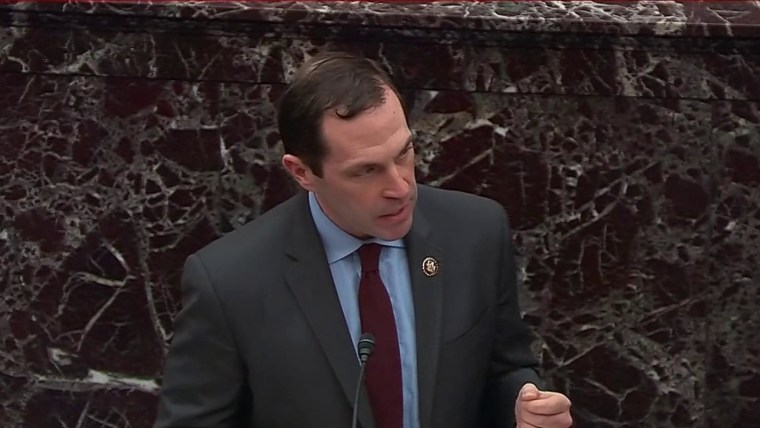Failing to remove President Donald Trump for abuse of power and obstruction of Congress would “render him above the law,” a House prosecutor argued in closing arguments in the president’s impeachment trial Monday.
“Impeachment is an extraordinary remedy,” Rep. Jason Crow, D-Colo., told the Senate, but “it is in the Constitution for a reason.”
“In America, nobody is above the law, not even a person who’s elected to president of the United State,” said Crow, one of the House managers in the impeachment trial. “I would say especially the president of the United States.”
Allowing Trump to get away with using the power of his office to try to get Ukraine to interfere in the 2020 election, “putting foreign interference between the voters and their ballots,” would render Trump “above the law,” Crow said.
Let our news meet your inbox. The news and stories that matters, delivered weekday mornings.
Another of the House managers, Rep. Val Demings, D-Fla., said another reason the Senate needs to take action is because the president has been “unapologetic and unrestrained,” and will only be more so if the Senate closes his eyes to his misconduct.
While House Democrats launched their closing arguments Monday on why Trump should be removed from office, the issue appears to be case closed for almost all Senate Republicans.
A supermajority of 67 votes is needed to convict a president, and only two members of the Republican majority, Sens. Mitt Romney of Alaska and Susan Collins of Maine, sided with Democrats on Friday in their unsuccessful bid to call relevant witnesses.
Some Republican senators, including Lamar Alexander of Tennessee, said there’s no need for witnesses because they believed the House managers had already proven their case, and that Trump’s actions, while “inappropriate,” aren’t worth removing him over.
Both sides have a total of four hours to present their arguments.
After closing arguments, the trial will adjourn until Wednesday, which will allow senators, who were not allowed to speak on the Senate floor during the trial, to deliver remarks about whether they are for or against the articles of impeachment.
Those speeches are expected to continue until Wednesday at 4 p.m. ET, when a vote on the two articles of impeachment — on abuse of power and obstruction of Congress — is scheduled to take place.
The proceedings are the third presidential impeachment trial in U.S. history, and the first not to feature new testimony from witnesses. Andrew Johnson’s trial featured direct testimony from 25 prosecution and 16 defense witnesses, while in Bill Clinton’s trial, three witnesses were deposed on video, and snippets of their testimony were played during the trial.
Sen. Chris Van Hollen, D-Md., said he believes the verdict is already in on the Senate, saying the body is “guilty of failure to meet its constitutional obligations.” He said he hopes his Republican colleagues, if they have “any sense of respect for the institution,” would introduce a censure resolution against the President.
Van Hollen said such a move is necessary because Republicans’ statements that Trump’s actions are inappropriate are like saying “these constitutional abuses were the equivalent of a parking ticket.”













